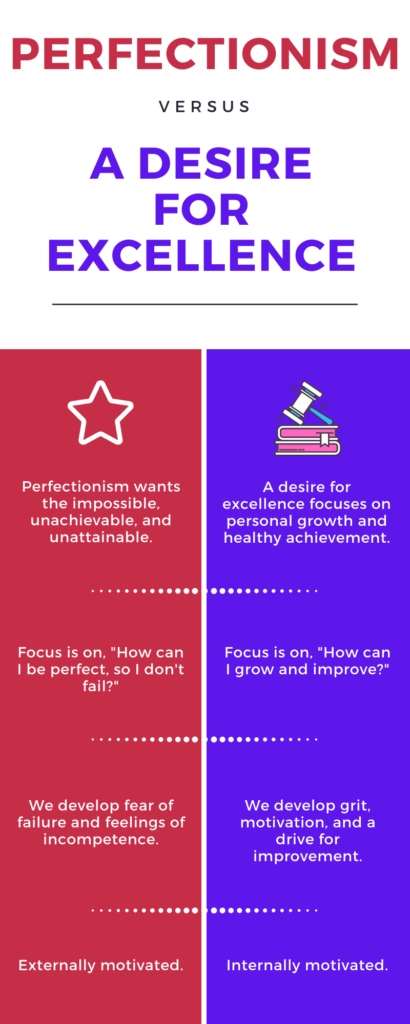It took me over 2 months to write this article.
Why?
Because of perfectionism.
Table of Contents
Here’s what happened

I decided to take a blogging course. Super highly recommended and definitely worth it. I felt I had all the knowledge I needed at my fingertips. Diligently, I did all the exercises in the course and I was so excited. I did the research, I decided on topics. The only thing to do next was start writing.
… And there I froze. I literally couldn’t move a step forward. Every day when I would sit in front of my laptop, I would start to panic. And I would step away. This continued for 2 months.
I just needed it to be perfect. And I was terrified that it wouldn’t be. After spending money on a course, a good amount of time completing it, if the end result was less than completely, incredibly perfect, what did that say about me? And so my perfectionism made me procrastinate over 2 months.
Related Posts:
- The Ultimate Guide to Burnout Prevention
- 7 Ways to Overcome Perfectionism (and why you should!)
- Overcome Fear of Failure and Develop Grit
- The 3 Types of Perfectionist. Which type are you?
Do you ever feel like this?
Like you want to do something so badly, and it is so important to you that you want to make it so incredibly amazing.
Yes, right?
But then this sense of wanting it to be amazing and perfect just leads you to put it off. You sort of get paralysed into inaction and you procrastinate doing it. The perfectionism makes you procrastinate. Sound familiar?
Our thoughts seem to be saying: if I don’t do it, it won’t get done, but at least I won’t fall short of perfect. I’m safe. I’ve avoided disaster.
If this sounds familiar, I hear you!
That’s exactly how I felt writing this article, and really doing anything I thought was super important to me. I felt like this for tests and exams all through high school and all the way through to medical school. I felt like this starting the blog and writing each and every article, until I started to clear away the cobwebs and figure out my perfectionism.
Can perfectionism be a good thing?
Let me start by saying that perfectionism is never a good thing. We may put it on our resume and blurt it out during interviews as a quasi-negative thing, but really it’s never a good thing.
Why?
What is perfectionism actually?
Because perfectionism is not wanting something to be the best thing you’ve ever done.
Perfectionism is wanting the unattainable or unachievable plus your self worth is dependent on you meeting those standards.
So let’s break this up. You’re trying to reach for something that is literally unachievable. Read that again. It is NOT achievable.
And then on top of that messed up cake, you put a frosting of: I am worthless if I don’t achieve this unattainable thing.
What a recipe for disaster! No wonder so many of us go into paralysis and just procrastinate.
Like I said earlier, if you don’t make it, it’s not done, but you’re also safe. Your self-worth is intact and you do not think you’re worthless.
[Side Note: That you might think you’re worthless and lazy for not even trying is a topic for another day 😊 But I’ll just say now, you are neither worthless or lazy for going into paralysis and procrastination mode!!]
So is the solution to just not try to do really difficult things? Things that seem almost unachievable?
Absolutely not!
I’ll be the first one to tell you to shoot for the moon, reach for the stars, climb the highest mountain, go to the ends of the earth, whatever!
What is the difference between a desire for excellence and perfectionism?
There is a difference between a desire for excellence and perfectionism.
With a desire for excellence you focus on personal growth and healthy achievement. So you’re asking yourself, how can I improve, what are my goals, what do I need to get there? And it is internally motivated – meaning you are doing it for you to grow and your self worth doesn’t depend on how others see whether you succeeded or not.
Perfectionism, as we mentioned before, is wanting the impossible. And the real problem with perfectionism is that it gives you the never-ending nagging feeling that you are not, and never will be, good enough. So, you’re left with an inevitable fear of failure. And lastly, it is externally motivated – in the sense that you think, “Everyone will know and see that I am not good enough!”

Where does perfectionism come from?
So now that we’ve talked about what perfectionism is and how it is different from wanting to achieve excellence, let’s talk about, where do this come from?
The belief
It is based on an early-learnt belief that if I am not perfect, I am not okay and I cannot be happy.
That belief has 2 main feelings to it
- Fear of failure. Thinking that failing will show everyone how worthless you are and you will feel awful. So, of course you are scared to fail.
- A sense of control. Thinking that perfectionism will allow you to control how people perceive you, your value, and the work you do.
[Side note: You cannot control what other people think of you. So it is none of your business what they think of you.]
Where do these feelings of fear and control and the belief that we have to be perfect come from?
First, you are not born with it. People do not come out of the womb thinking, “Perfect landing! I mean to go on the way I started!”
Instead, it develops during your experiences in childhood. For everyone these experiences are a little bit different.
Possibilities:
Rigid parents with high expectations
Examples:
1. Dad who expects a start athlete who scores at least 3 goals every soccer game.
2. Mom who expects straight A’s in school.
In both examples, feelings of love and warmth towards the children are dependent on meeting those standards. Upon failing to meet those standards, there is disappointment, looks or talk of worthlessness or low worth, or criticism.
Highly critical, shaming parents
Examples:
1. You get 95% on an exam, parents say, “What happened to the other 5%?”
2. You are struggling in school, parents lie to their friends about how great you’re doing, establishing the idea that it is shameful to be struggling.
Excessively praising your achievements
This is when parents are constantly telling you how amazing and smart and incredible your achievements are.
This is different from praising your effort and hard work, which is very beneficial. (Praising hard work and effort establishes within children the idea that it is good to work hard and struggle to learn something – this is how you grow. These children do not have a fear of failure because the end result (success or failure) was irrelevant in the upbringing. It was the effort that was praised.)
Praising achievements shows us early that only when we succeed will we get their love and praise. Anything less is no good.
Often it is a combination of all of these things.
Side note: Before we go ahead and judge our parents and blame them for everything that is wrong with us and the world, let’s step back and realize, they did their best. They tried to make us into successful adults and this was the only way they knew how. So try to forgive them. You’re here now, you’re an adult, you can figure stuff out for yourself now. We’ll do it together.
Why this has such an effect on us
These 3 possibilities had such an effect of us because as children we have a strong desire to please adults and be loved by them. This is combined with a sense that adults are all-knowing. If they make a look or say something that suggests disappointment or lack of worth, we believe them. We internalize this and believe we indeed are not worthy and are a disappointment.
We do not have the skills yet to understand that it is an opinion, and that the thing we DID may be a disappointment to THEM, but this does not mean that it is indeed a disappointment or that we ARE disappointments.
But we internalize it anyway, and so perfectionism is born. We believe that the only way to get love and affection is to do everything absolutely, completely perfectly, without ever making a mistake.
Moving to adulthood, these thoughts have stayed with us. However, now, instead of the topic being sports achievements or school marks, we are talking about clients, our boss, our spouse.
How perfectionism can come across in adulthood
At work
Pitching for a new client: “I need this pitch to go perfect and we land the client’s whole portfolio!”
Thought behind the perfectionism thought: I’m scared that the client will think I’m awful and hopeless.
Boss gives me a report to do: “I need this report to be spectacular, the best one yet, absolutely no mistakes, the most perfect report!”
Thought behind the perfectionism thought: I’m scared that my boss will think the report is awful, that I’m an idiot and will criticize me for it.
In social situations
Going out with my spouse and his friends: “I need to speak and act perfectly at this dinner, and not say anything stupid or silly, so that my spouse is not embarrassed by me and that all his friends like me immensely.”
Thought behind the perfectionism thought: I’m scared that his friends won’t like me and that he then will think less of me. Maybe I’m just really weird.

Your side hustle
You really want to start that side hustle you’re so passionate about: “It needs to be perfect! The best one out there! The most perfect one if will stand any chance of making it amongst the already prominent businesses out there!”
Thought behind the perfectionism thought: I’m scared that I’m not good enough to do this side hustle and that I’ll fail after giving it my very best effort and everyone will see and know. That would be so embarrassing.
What happens with all of these is a lot of stress, anxiety, and depression. We freeze. We cannot move forward. So we put off that report for so long, that pitch, starting that side hustle we’re passionate about, try to ignore the upcoming dinner, because procrastinating and putting it off is easier than trying and having to deal with the horrifying fact that it will NOT be perfect.

Because remember, this perfect is unachievable.
This is something that can be worked through slowly. Next week we’ll be jumping into the types of perfectionists and what to do about it! Stay tuned because although this perfect is unachievable, what is achievable, is large, high strides towards your goals, towards the kind of life you want and deserve to live. The kind of life where you are happy, calm, satisfied.
Here is what the desire for excellence can look like instead of perfectionism
Where you will work your butt off for the client pitch and report, looking at your old reports, going the extra mile, improving on your previous work, but knowing that you are doing it to grow, to do a good job for yourself, and most importantly, that your self worth is within you and does not hinge on how well you do on this job.
Where you will absolutely get dressed up as much as you want for this dinner and you will put an effort into chatting with his friends and getting to know them as much as feels appropriate, but you will also have a good time, and have laughs, and be calm and relaxed. And again, most importantly, your self worth and how amazing you are does not hinge on what his friends think of you, or even what he thinks of you. Your self worth comes from you. Only you can decide what it needs to be.
Where you will take the leap and slowly start the side hustle. Learning as much as you can along the way, meeting new, interesting people and learning from them and sharing your new mutual experiences. Trying new ideas and seeing which work. You will enter a whole new exciting world and be the better person for these new experiences. And your self worth still doesn’t depend on whether the side hustle becomes a huge financial success because your self worth is within you and doesn’t depend on the success of the side hustle.
Why perfectionism made me procrastinate
So after over 2 months of working on this article it has finally come to an end. Was it scary?
Yes.
Was it as scary as I built it up in my head?
HA! Not even close. With a latte next to me, smooth jazz in the background, I feel like I could take on the world!
Just joking. There is the next article to write, and there will be the next one after that. But I feel like I got over a significant hurdle – I did the first one.
See you next week where we’ll go into specific tactics (and which ones I specifically used for this article) for how to deal with perfectionism and the paralysis and procrastination that comes with it! So you can lead the life you deserve!

Summary
Perfectionism is wanting the unattainable or unachievable plus your self worth is dependent on you meeting those standards.
Desire for excellence is when you focus on personal growth and healthy achievements. It is internally motivated. Perfectionism is wanting the impossible and it is externally motivated.
Perfectionism is a belief learnt in childhood that if I am not perfect, I am not okay and I cannot be happy.
That belief has two main feelings to it: fear of failure and a false sense of control.
We learn as a child perfectionism and internalize it, taking it with us into adulthood.
Perfect is unachievable. What is achievable, is large, high strides towards your goals, towards the kind of life you want and deserve to live. The kind of life where you are happy, calm, satisfied.
Check out the article on specific tactics for how to deal with perfectionism and the paralysis and procrastination that come with it! So you can lead the life you deserve!





